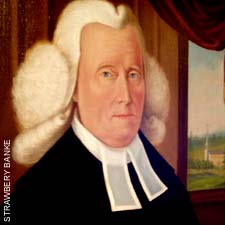| Rev Samuel Haven Fathered 17 |

LITERARY LIONS
He was a prolific man in many ways. Portsmouth’s popular minister sired some of the city’s most important citizens. He also experimented with medicine, preached powerful sermons, made gunpowder in the Revolution and was an amateur chemist. He’s best remembered today for a South Mill Pond park that bears his name.
Rev. Samuel Haven
(1727 – 1806)
South Church minister
The father of 17 Haven children who played such an important part in the city’s post-Revolutionary flowering, Samuel Haven was called to the South Parish pulpit in 1752 where he served the rest of his life. As a teenager in Massachusetts he heard the English divine George Whitefield preach and, after a few years teaching, the memory of that vital experience drove him to Harvard and the Congregational ministry. In 1757 a dozen of his congregation charged him with heresy for not preaching a Calvinistic predestination, his views were upheld by an ecclesiastical trial and the bulk of his congregation. Those still dissatisfied joined the tradition-minded Rev. Joseph Buckminster at North Church.
While a dozen of his most popular sermons, plus other discourses, lectures, and verse were printed locally, much of his work remains only in manuscript. A classmate’s 1747 diary records his poem titled "The Happy Student", a moral tale against sporting, drinking and swearing composed in his sophomore year. The Portsmouth Athenaeum preserves more than a dozen of his manuscript sermons, many preached from 1752 to 1797 both "at home" in Portsmouth and from other New England pulpits.
A philanthropist and liberal Unitarian thinker, he was rewarded with an honorary degree from Edinburgh in 1770 – after Samuel Sherburne sought Benjamin Franklin’s help in an effort to repay Haven for the 1767 funeral sermon he preached for his father . He received another honorary degree from Dartmouth in 1773.
Haven ministered to the sick and even practiced with homespun medicine. His familiarity with chemistry led him to experiment with dyes (he showed them to George Washington) and led him to help produce saltpeter for gunpowder for the American troops during the Revolution. When asked what Washington should be called when he visited in 1789, he composed these impromptu lines:
Fame spread her wings, and with her trumpet blew,
Great Washington is near! What praise is due?
What title shall he have? She paused and said,
"Not one, his name alone strikes every title dead!"
A beloved figure, Haven was retained at South Church after 1800 even as his health failed. Timothy Alden, Jr. served as his assistant from 1796, but the younger minister’s "New Light" Puritanism ran afoul of the Unitarian beliefs of the South Church and he left to form a new academy. Alden’s later History of Religion in Portsmouth reflects his view of that disagreement.
